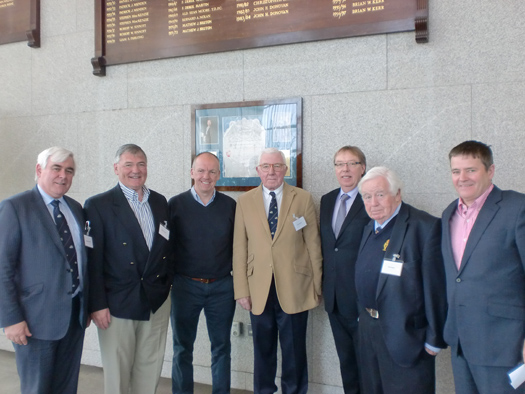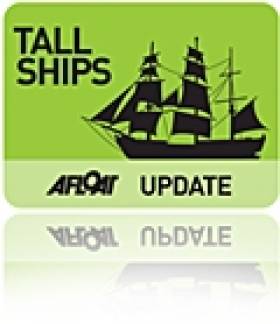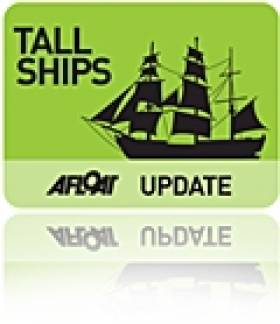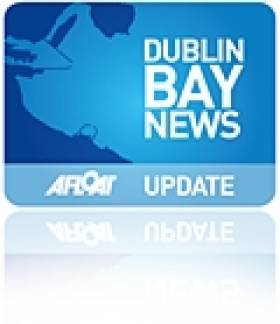Displaying items by tag: Enda Connellan
Dubin's Lord Mayor opened a Tall Ship and Youth Sail Training Workshop with an agenda to seek a solution to the current Irish Sail Training impasse caused by the loss of sailing's Asgard II and Lord Rank.
Over 70 delegtes including many of the 'top brass' of the Irish Tall Ship commuunity attended the meeting held at the offices of Dublin Port Company on Saturday (26th March). The meeting inlcuded members of Coiste an Asgard, port companies, education, tourism and other sailing interests.
The meeting was formally opened by Dublin Lord Mayor and Port Admiral, Gerry Breen who introduced the chairman Lord Glentoran and the Facilitator Michael Counahan.

From (Left to right) Seamus McLoughlin, Dublin Port Head of Operations, Enda Connellan, Chairman Tall Ships Dublin 2012, Des Whelan, Chair Tall Ships Waterford 2011, Lord Glentoran (Robin Dixon) Chair Tall Ships Belfast 1992, Dr. Gerard O'Hare, Chair Tall Ships Belfast 2009, Ted Crosbie, Tall Ships Cork and Enda O'Coineen, LetsdoitGlobal.
Des Whelan gave an excellent talk and presentation on Tall Ships Waterford which was followed by a discussion on the massive economic benefits of bringing Tall Ships Festivals To Dublin, Cork and Belfast. Chairman of Tall Ships Dublin 2012 Enda Connellan and Ted Crosbie of Tall Ships Cork and Dr. Gerard O' Hare of Tall Ships Belfast discussed the incredible success stories from their respective ports festivals.
Several presentations and discussions followed regarding the role of Tall Ships in Sail Training, the connection between a vessel for Ireland and running events here. The question of who are the stakeholders and how can benefits be quantified was also discussed.
The meeting was hosted by Dublin Port Company who provided a warm welcome, excellent facilities, refreshments and a wonderful lunch with senior management attending to everyone's needs.
After lunch there were further discussions on what is the most suitable vessel, who should run the organisation and what would work best for Ireland.
Jimmy Tyrrell gave a short, eloquent and emotional account of Asgard II and the realisation of his father's dream which was fulfilled beyond all expectation by that legendary vessel and those who were privileged to sail on her. He affirmed his own belief that the way forward was with an All-Ireland Tall Ship and even suggested that she be called Spirit of Ireland. There were other suggestions for a name inlcuding 'Ireland's Call'.
A view was also expressed that politics and religion have no place in Sail Trail Training and the future lay in an All-Ireland Commercial/Charitable Trust Venture.
The prohibitive nature of current legislation and the total lack of awareness of the maritime sector by the Government was mentioned several times.
Ocean Youth Club NI provided four young sail trainees to address the gathering on the benefits of Sail Training from their perspective and representatives from education, tourism Tall Ships International and "Association Of Tall Ships Organisations" also contributed.
The general consensus was the need to develop and promote, as a matter of urgency, a plan for a Tall Ship For Ireland linking Youth, Maritime Education, Business and Tourism.
Another workshop will be held in Belfast in April and the collective input of both meetings will be considered going forward.
A Tall Order for Ireland? HERE
Regular updates on Irish Tall Ship sailing news HERE
More on Asgard II HERE
Dublin to Welcome Tall Ships into the Bay in August 2012
For the first time since 1998, Dublin City will welcome back sailing's International Tall Ships Races, presented by Szczecin, Poland. As final host port for the 2012 Tall Ship Races, the event will see up to 100 Tall Ships sail into Dublin for a four day Festival and celebration, from Thursday the 23rd August to Sunday 26th August, 2012. Ships from as far away as Chile, Mexico, Argentina, USA and European and Baltic countries including Italy and Norway will chart their course to Dublin.
Over 5000 participants will compete in these "experience of a lifetime" races and there will be opportunities for young trainees from Dublin to be selected to participate in the races. The event offers young people a unique setting for developing essential life skills like team building, leadership, multi-cultural understanding and friendship with participants from up to 50 countries taking part.
The Lord Mayor said, "The visit of the Tall Ships to Dublin will be the biggest event in Ireland in 2012. It will provide a major boost to all city businesses and will enhance Dublin's position as a major International event destination. It should be great fun for everyone, young and old".
The next 18 months will see opportunities for businesses to get involved in sponsorship of the event such as the Trainee Recruitment Programme. These magnificent ships will also take bookings for corporate hospitality and it is expected that 1.5 million visitors from home and abroad will attend a full programme of activity and entertainment for all ages during the festival.
Commenting at the launch of the Tall Ships 2012, Mr. Enda Connellan, Chair of the Tall Ships Steering Group said, "When Dublin last hosted the Tall Ships Races in 1998 it reminded us all of the rich history and close associations between the port and the city that has grown up around it. When the Tall Ships return in August next year they will be greeted by a significantly altered skyline that now includes the Samuel Beckett Bridge, Dublin Convention Centre, the Spire, the Grand Canal Theatre and the O2. One million citizens visited the Tall Ships festival then and I have no doubt that many more will experience the carnival atmosphere when these magnificent sailing ships return to Dublin in 2012"
The races in 2012 will visit the ports of St. Malo in France, Lisbon in Portugal, Cadiz and La Coruna in Spain, from where they will set sail on the last leg of their races to their final host port, Dublin.
Eamonn O'Reilly, CEO of Dublin Port Company that manages Dublin Port said, "I am delighted to welcome the Tall Ships Races to Dublin Port, Ireland's premier port. The Port handles 50% of all Ireland's imports and exports, making it a significant facilitator of Ireland's economy. In addition it welcomes 1.7 million tourists through the ferry companies operating there and 2010 saw an additional 130,000 tourists and crew from the 85 cruise ship calls to the Port "
Looking for further reading on Tall Ships in Ireland? Click the links below:
Click this link to read all our Tall Ships Stories on one handy page
Previewing Ireland's Tall Ships 2011 Season
Can Ireland Get a New Tall Ship?
A ship's pass dated 1687, signed by King James II and Samuel Pepys, which was acquired by the Dublin Port & Docks board in 1924, was presented to the National Library of Ireland today by Enda Connellan, CEO, Dublin Port Company who noted that "Dublin Port Company is delighted to present this interesting and rare historical document to the National Library of Ireland. This will ensure that it is appropriately conserved and displayed. In its new home it will also be more accessible to the public."
The pass is one of the few known examples of 17th century ships' passes in the world, with others held at the National Archives in Kew, London and at the National Maritime Museum in Greenwich.
The example presented to the National Library of Ireland was designed to provide passage for the merchant vessel the Mary of Cork, free from interference by English warships or warships belonging to states maintaining diplomatic relations with England.
The vessel left Dublin port in late 1687, bound for the Canary Islands. At the time, the Canary Islands were major exporters of sugar and Malvasia, a fortified white wine which travelled well and was extremely popular in Britain. The Mary of Cork may have been trading in such foodstuffs, in return for products such as salted Irish beef.
The vessel was manned by a crew of five and captained by Zachary Peebuchet.
The Mary of Cork ship's pass was issued at the Court of Whitehall on 29 September 1687 and was signed by King James II (Lord High Admiral 1685-1688) and Samuel Pepys (in his capacity as Secretary to the Admiralty). On 18 April 1688, the ship's pass was returned to Ireland, where it was entered into the registry of the High Court of Admiralty of Ireland by Thomas Williamson. It was acquired by the Dublin Port & Docks Board in 1924, and will soon be on display in the National Library's Department of Manuscripts.
































































